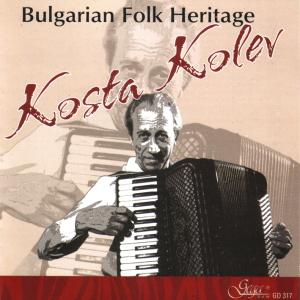Kosta Kolev's interest in music emerged during his early years in his hometown Kotel, Sliven region, when he was learning to play the accordion. He later graduated the National Academy of Music in Sofia and joined the Bulgarian National Radio in 1949 to remain with it for life. Kolev first worked with the Ugarchin Group but later took over as conductor of BNR Folk Music Orchestra and dedicated to it 30 years of his life. Today he is unanimously acknowledged as the man with an exceptional role in making this orchestra the best folk orchestra in Bulgaria. Demanding as both conductor and composer he worked to build a repertoire for it that was huge in volume.
 Kosta Kolev was also a great expert in folk instruments. This helped him in balancing their diverse timbers for the sake of a brilliant orchestral sound. His colleagues take pleasure in playing his compositions - always fitted to comfortable ranges and ornamentation and guaranteed to impress. He was a preferred author of solo arrangements for folk singers and instrumentalists who were very flattered when he wrote music for them. His works grew to immense popularity among radio listeners.
Kosta Kolev was also a great expert in folk instruments. This helped him in balancing their diverse timbers for the sake of a brilliant orchestral sound. His colleagues take pleasure in playing his compositions - always fitted to comfortable ranges and ornamentation and guaranteed to impress. He was a preferred author of solo arrangements for folk singers and instrumentalists who were very flattered when he wrote music for them. His works grew to immense popularity among radio listeners.
When writing music based on folklore composer Kosta Kolev strictly adhered to the purity of style and dialect and accounted for the specifics of folklore samples. He was among the pioneers who skillfully mixed the sounds of traditional and classical instruments. His work is at the foundation of folk music training in specialized high schools and academies. His experience has been invaluable for many musicians. Here is more about him from his widow, singer Maria Leshkova.
“It was an honor to live and work with him. God had endowed him with a long life and we shared a lot. He had a mystery about him. When he came to Sofia after World War 2 his family thought that music had no future, but he was stubborn and self-taught. It was composer Parashkev Hadjiev who helped him skip dentistry for the sake of music. The key lesson I learned was how to draw ideas from the authentic material. I recently found a remark he had written on a score and it reads, the true Bulgarian sound, ultimately”. When I met him I was 23. I had already graduated from the Academy of Music in Plovdiv but he advised me - how to select my repertoire and what to do to add artistic value to a song, to make it unique. He sat on the juries of various festivals and gatherings where folk songs and melodies were performed, and he used to collect folk music material from all regions. He was acknowledged by young and old and was invited to teach, but he would say that all he wanted was the creative work. Anybody who wants to ask me is welcome, he would say. Kosta worked hard for the National Radio and for many ensembles. He motivated musicians to record and tried to make them more ambitious and to provoke them. I am currently working to digitalize the most important body of his work but my priority is to hand down to young musicians the archival material he collected from various gatherings and festivals - the unknown songs. I am working on such a volume with folk songs from across Bulgaria that will be quite useful to young musicians.”
English Daniela Konstantinova
Audio features the following pieces by Kosta Kolev:
1. Balkan Range Chain Dance performed by the Bulgarian National Radio Folk Music Orchestra
2. Kalimanku, singing Yanka Rupkina
3. Swing Swinging performed by the Bulgarian National Radio Folk Music Orchestra
4. Zaiko kukuraiko by singing Kostadin Gugov
5. Buenek Dances performed by the Bulgarian National Radio Folk Music Orchestra
The Surva festival begins with the lighting of bonfires and mummers dancing the horo chain danie around the fires on the night of January 13-14. The power and timelessness of the masquerade tradition has led UNESCO to declare it a World Heritage..
Mummers from the neighborhoods of Bulgaria's town of Blagoevgrad, the neighboring villages and guests from Petrich paraded at a carnival in the regional town, as the sounds of hundreds of bells filled the town. For yet another year, the Mummers'..
For more than 20 years in the city of Montana, there has been a tradition on January 6 for people to go to Montanenzium Park, where there is an artificial lake, suitable for conducting the Orthodox Christian ritual called "Saving the Holy Cross" on the..

+359 2 9336 661
